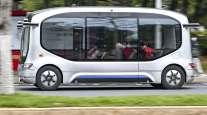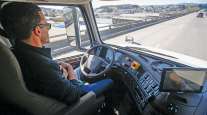Vice President of Commercialization, Torc Robotics
Perspective: Autonomous Trucking Is Not a Race

[Stay on top of transportation news: Get TTNews in your inbox.]
Autonomous trucking is on the verge of breaking through on a national scale, bringing potentially revolutionary changes to freight and supply chain management. But how will self-driving trucks win the trust of the millions of Americans driving their own vehicles alongside them?
Industry leaders are following the lessons of the tortoise and the hare: A slow and steady approach will always be preferable to hasty and shaky, particularly when highway safety is the priority. To prepare self-driving technology for the country’s many freight corridors, the industry is investing heavily in longhaul testing to ensure the technology is field-tested and ready to handle the unpredictable conditions that human truck drivers face every day.
According to the J.D. Power 2023 U.S. Mobility Confidence Index, autonomous technology has a meager 37% consumer confidence score. Given the scrutiny focused on every self-driving car crash, the autonomous vehicle industry has no room for missteps.
RELATED: Autonomous Trucks Reshaping the Freight Industry

Elder
One of the main challenges for autonomous trucking is ensuring that the technology can handle any situation that might arise on the road. To achieve this level of robustness, the software needs to be trained on massive amounts of real-world data, collected from different locations, times and scenarios. Enter: longhaul testing. Without many federal regulations to keep the industry moving in lockstep, quite a bit of responsibility was placed on autonomous trucking trailblazers to find the right testing structure and technique for these longhaul drives. Consequently, this gave the industry quite a bit of freedom in how to approach longhaul testing. While the concept of testing an 80,000-pound vehicle on public highways may sound astonishing, that’s what many leading autonomous innovators are doing in the Southwestern U.S. — a region with ideal testing circumstances. With a varied road network, diverse landscape, unpredictable weather patterns and access to major freight corridors, driverless trucks are already being tested there.
These trucks — currently manned by a safety driver and a safety conductor reporting all of the driver’s observations per Torc’s testing procedures — are not just covering miles. While the self-driving software makes critical decisions on the road, like “seeing” traffic lights changing colors or interpreting street signs made for human vision, the truck also is moving real cargo. Testing with customer loads ensures that the AI and machine-learning technology behind the software can be trusted to properly maneuver the truck with varying load weights, distributions and cargo types.

►Who's Still In Autonomous Trucking?
►Clevenger: Autonomous Trucking: A Rapidly Shifting Landscape
►Company snapshots: Aurora | Kodiak | Torc | Waabi | Stack AV | Gatik | Plus | Einride | Forterra | Outrider
►From November 2022: Who's Who in Self-Driving Truck Development
This also means that testing cannot be rushed. Autonomous vehicles are new territory to be charted, and it’s critical that product quality, not timelines, drive companies’ developments. The industry is unique in that each company’s success isn’t individual — the industry as a whole is frequently judged by the successes and shortcomings of each company within it, making it all the more important to have a shared mindset of safety above all. While this is not a consumer-facing product, buy-in from the public is crucial in seeing this sort of innovation through.
As autonomous trucking graduates from its proving grounds in the Southwestern U.S., we can expect to see driverless, longhaul freight testing ramping up across the country in broader and more challenging scenarios that further mature the technology. This expansion won’t just benefit the autonomous vehicle industry, it also will usher in greater safety and efficiency for supply chains. Moreover, the data, insights and best practices gathered can be shared with regulators, policymakers, researchers and educators for greater public awareness and acceptance.
As autonomous trucking progresses, longhaul testing will continue to play a vital role in advancing the technology and preparing it for widespread adoption. Expect testing to branch out to new highways and freight corridors.
Corey Cox of the Tandet Group of companies discusses how early AI adopters are beginning to harvest the latest wave. Tune in above or by going to RoadSigns.ttnews.com.
With the right mindset of slow and safe learning, today’s longhaul testing environment could steadily transition into a fully scaled supply chain network.
As the VP of commercialization for Torc Robotics, Nick Elder leads the commercialization strategy and execution for Torc’s longhaul autonomous solutions.
Want more news? Listen to today's daily briefing below or go here for more info:





